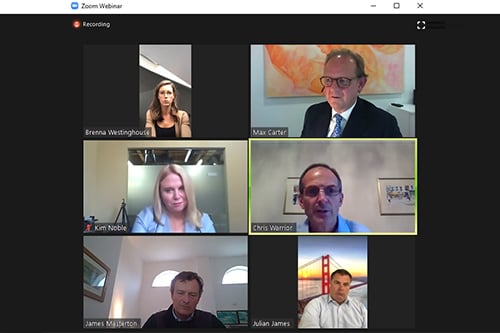

It may be over seven months since the COVID-19 crisis was first recognised by the World Health Organization as a pandemic but, with no clear end in sight, what a post-pandemic future will look like remains anybody’s guess. The Professional Liability Underwriting Society (PLUS) recently gathered for a webinar to discuss how the London Market is reacting to the COVID crisis. And it was at this event, which was entitled ‘London, You’re on Mute! The New Normal’, that moderator Max Carter, CEO, New Dawn Group, noted that there are several questions the market is grappling with right now.
“Are we as a market positioning ourselves to capture all the opportunities that we could be?” he asked. “Are we winning the hearts and minds of a new generation of US and other overseas brokers, who have up until now had little reason to deal with London? And, probably most importantly, are we providing our clients with the service that will keep them coming back to London once the hard market starts easing?”
These questions inevitably lead to the consideration of how well the London Market has reacted so far to the pandemic. Examining this, Brenna Westinghouse, focus group leader and underwriter at Beazley said that she was personally impressed by the responsiveness of the sector and its ability to seamlessly transition to interacting with people as if there was no physical distance.
From a service-level viewpoint, she said, the reaction of the market has been remarkable, and the responsiveness of the sector has been superior to what initial expectations had predicted.
“If we go back to March,” said Julian James, CEO of Sompo International, “I was certainly pretty worried how we would be able to switch from working in the office to working remotely. And I think, by and large, the market carried on trading without missing a heartbeat and that is a massive tick. I think the market has also got its mind around the new risk environment. Yes, there was quite a lot of discussion early on about what exclusions or what language should be used on policies for the new environment but that’s settled down now.”
Despite the ongoing losses the market appears to have digested the financial impact of the crisis, he said, and the numbers coming in the Q3 results highlight that there haven’t been any major failures of any market worldwide which is a big tick in their favour. Overall, James would give the London Market quite a high mark for its responsiveness and reactiveness, as well as its ability to make decisions quickly, and he emphasised that these are the things for which London is renowned.
Carter next reached out to Kim Noble, senior VP, Thompson Flanagan, for perspective from the other side of the Atlantic, to examine whether the London Market has been living up to the high standards it has set itself. Noble believes that for an industry not known for its technological acumen, the insurance sector did a good job of transitioning very quickly to a new model.
“I think one of the things that was most challenging about that transition is you had a convergence of two different things,” she said, “you had a hardening market in the professional lines and difficult messages that were having to be delivered, on top of new technology and new methods of communication.
“And actually the communication piece of it was quite well done and that I think is the key to getting through a hardening market and a global crisis… everybody was very communicative, very open, and very quick to respond to questions and issues. So, from that perspective, we were very successful, and we’ve probably surprised ourselves in the process by how successful we were.”
Westinghouse noted how the benchmark of performance has changed since the crisis began. As the months have passed the real focus has shifted from pleasant surprise at how well businesses are responding, she said, to a consideration of the impact this is having on those working through the pandemic.
“We found at Beazley that people were working 12 plus hour days because their working environment was their home environment,” she said. “And we were trying to pull them out of that transition and trying to encourage people to take holidays. In London, we were eased back into work at the government’s recommendation, we had that carrot dangled overhead and then taken away from us to a certain extent.”
The pressing concern, she said, is the lockdown fatigue that people are experiencing, which is likely to extend through the winter. If a return to the office and to familiarity had been possible this would have been less of a concern - but the Groundhog Day that is COVID and the prospect of maybe six more months of this is inevitably going to have an impact on people’s psyche. James added his own concern about the impact the crisis is having on people’s wellness and that this is uncharted territory for every organisation.
“I’m pleased that people have identified it as an issue,” he said, “we certainly have as a company. But whether we’re doing the right things or not, you’ll have to ask in six months time.”
